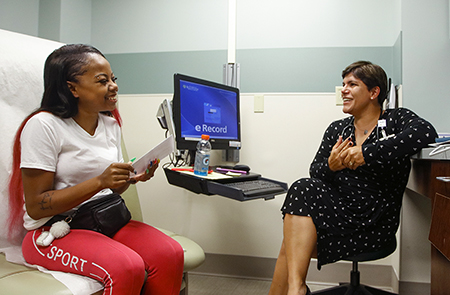Golisano Children's Hospital / News / Support for Sickle Cell Patients
New Grant Will Provide Additional Support for Sickle Cell Patients Transitioning to Adult Care
12/14/2020
The Complex Care Center (CCC) at the University of Rochester Medical Center has received a grant from the Access to Excellent Care for Sickle Cell Patients (ACCEL) Grant Program – funded by Global Blood Therapeutics, Inc. – for 50 thousand dollars over 12 months to fund a care management position to help pediatric sickle cell patients transition from pediatric to adult care.

The project, titled “Improving Transition from Pediatric Specialty Care to Adult Health Care for Individuals with Sickle Cell Disease,” will provide a new care management infrastructure to build on the successes of the pediatric hematology and transitional care medicine. The division of pediatric hematology has a history of doing an outstanding job of initiating conversations about transition and connecting their patients with the resources for the CCC, which has demonstrated success in helping patients navigate the challenges of adult care.
“Patients with complex medical problems, such as sickle cell disease, are at high risk for morbidity and mortality around the age of transition,” said Francis Coyne, M.D., senior instructor in the Division of Transitional Care Medicine and Principal Investigator for the grant, “this grant helps us strengthen the infrastructure supporting these patients and engage them early in childhood, around the age of 12, to support a safe and well-anticipated transition, building on the groundwork of the divisions of pediatric hematology and transitional care medicine.”
The CCC’s mission is to help children with life-long diseases – such as cystic fibrosis, sickle cell, autism, childhood cancers, etc. – build confidence and autonomy as they move to adult care. Only a few types of these centers exist in the United States, but demand for this type of care is rising as the patient population grows. Thanks to medical advances, more children with special health care needs now reach adulthood.
“Patients with complex medical problems, such as sickle cell disease, are at high risk for morbidity and mortality around the age of transition,” said Francis Coyne, M.D., Principal Investigator for the grant.
For sickle cell patients, the most common lifelong symptom is pain. “The primary way that practitioners encounter sickle cell disease is during painful episodes that occur when sickled blood cells clog up blood vessels, leading to a lack of oxygen and in some cases tissue death, which is very painful. When teaching about this, I’ve often compared it to the clutching pain of a heart attack,” said Coyne.
Despite the prevalence of severe, chronic pain, however, sickle cell patients – the large majority of who are Black – face obstacles getting access to adequate pain control. These obstacles can be attributed in part to systemic racism in the health system, lack of education surrounding sickle cell pain, and newer restrictions due to the opioid crisis, according to Coyne.
“Patients with sickle cell disease have a tendency to be labeled pain seekers. And there is clear evidence that there are racial disparities in the treatment of pain. There is some evidence that patients with sickle cell feel discriminated against based on their disease. We have to advocate for our patients, because it’s very rarely the case.”
In addition, sickle cell patients are often reluctant to take potentially-effective, new therapeutic drugs due to historical exploitation of the Black community within the medical/pharmaceutical fields. “There’s a perception that the Black community is being used as an experiment for new drugs,” said Tiffany Pulcino, M.D., M.P.H. Chief of the Division of Transitional Care Medicine.
As a result, many people with sickle cell disease learn to take care of themselves and be advocates for their own care as they enter adulthood, and the CCC works to elevate patients’ voices and strengthen trust in the patient-doctor relationship through partnership and advocacy. “Our goal is to expand the services of the CCC and engage children and their parents during early adolescence so they are well-prepared for adulthood,” said Coyne.
Many services the CCC provides are meant to “meet patients where they are,” according to Coyne: asking questions and providing guidance for day-to-day management such as medications, but understanding the patient’s own needs and not being punitive. “If a patient can’t take medicine every day, then we try help them take it as often as they can,” said Coyne.
“It really needs to be an empowerment model,” said Tiffany Pulcino, M.D., M.P.H. director of the CCC, “you can address all the concerns you want, but you have to create trust.”
As with many patients, social determinants of health influence patients with sickle cell disease and their ability to access health care, such as not being able to take time off of work for multiple appointments or lacking adequate transportation options. This grant will provide direct technological resources to address these obstacles, including two iPads that will allow transitional care medicine physicians to conduct transition consult telehealth visits in collaboration with their hematologist to avoid multiple appointments. A third iPad will be provided for home use for patients who face major difficulties with transportation.
In addition, ten cell phones with one-year plans will be provided for patients in need to support stable communication with their health team. The grant will also provide infrastructural support for the maintenance of a registry of every patient engaged in this transition program, allowing CCC staff members to monitor patients’ progress and implement intervention plans where needed.
“It really needs to be an empowerment model,” said Tiffany Pulcino, M.D., M.P.H. director of the CCC, “you can address all the concerns you want, but you have to create trust.”